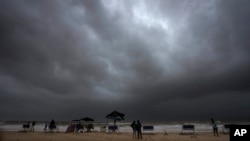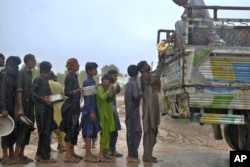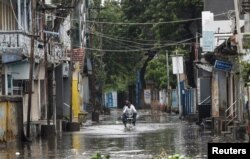Cyclone Biparjoy made landfall Thursday evening in the Indian state of Gujarat as officials warn that large parts of northwestern India and southern Pakistan will likely face heavy rain, flash floods and high winds.
The powerful cyclone, which has been barreling toward the neighboring countries from the Arabian Sea for a week, reportedly made landfall near the southwestern port town of Jakhau, in Gujarat.
More than 170,000 people in India and Pakistan were evacuated to safety before the cyclone arrived. Forecasters estimate Biparjoy — which means "disaster" in Bengali — could be the region's worst storm in 25 years.
These sorts of intense storms are becoming more common due to worsening climate change, experts say.
"The reason why Biparjoy has lasted so long is that it is feeding on warm waters in the Arabian Sea," Raghu Murtugudde, a visiting professor at the Indian Institute of Technology Bombay, told NASA's Earth Observatory. "Biparjoy is an example of how climate change — especially warming in the upper ocean — is contributing to cyclones moving slower and lasting longer."
The cyclone will likely lose intensity as it moves inland toward central Gujarat and neighboring Rajasthan state, according to an official with India's National Disaster Response Force.
"The main impact will be in the Kachchh [district] and Saurashtra area of Gujarat," Narendra Singh Bundela, the agency's inspector general, told local media. "As it moves inwards, it will lose intensity, but heavy rainfall is expected in some districts, which could lead to flooding."
Gujarat state officials said that 94,000 people were evacuated from coastal areas.
The storm is also set to strike the coast of Pakistan's Sindh province. Officials evacuated 81,000 people from the coast.
As the cyclone hit India, the storm was "still at a distance from Pakistan," Pakistan's Minister for Environment and Climate Change Sherry Rehman said.
The cyclone "will likely begin counter clockwise landfall around or after midnight in our coastal areas. Sea may be rough with high waves at the core," Rehman said in a tweet. "Please stay safe."
"Want to request folks not to panic," Rehman said in a later tweet. "All preparations are in place. Don't go out to 'see the storm' or venture into the water. Sindh police has better things to do right now than plead for picnickers to come back to dry land."
This is the first major storm to hit Pakistan since devastating floods killed 1,700 people last year.
Some information in this report came from the Associated Press.







